The August Political Bureau Meeting
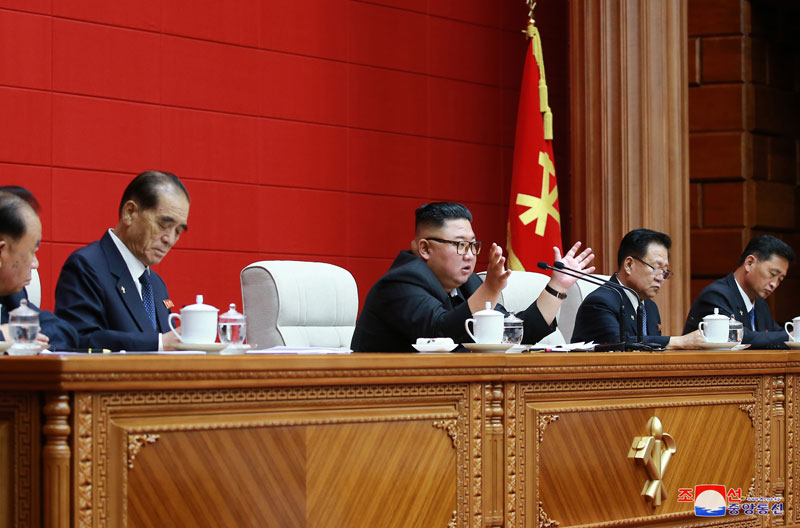
Kim Jong Un speaks during an 13 August 2020 meeting of the Political Bureau. On the platform with him are the Presidium Members of the Political Bureau (L-R): Ri Pyong Chol, Pak Pong Ju, Choe Ryong Hae and Kim Tok Hun (Photo: KCNA).
The 16th (!!!) Political Bureau meeting of the 7th Central Committee convened on 13 August (Thursday) at the Party Central Committee Headquarters Building (aka, Office Building of the Central Committee) in central Pyongyang. Kim Jong Un (Kim Cho’ng-u’n) came out to the platform and presided over the meeting. Also in attendance were member and alternate (candidate) members of the Korean Workers’ Party [KWP] Political Bureau, Central Committee Department Directors and Deputy Directors, DPRK Cabinet Vice Premiers and Ministers, chairs of the KWP Provincial Party Committees, leading cadres and chief functionaries of guidance commissions and national institutions, senior Korean People’s Army [KPA] commanders, leading officials of the internal security services and members of the Central Emergency Anti-epidemic Headquarters [CEAH].
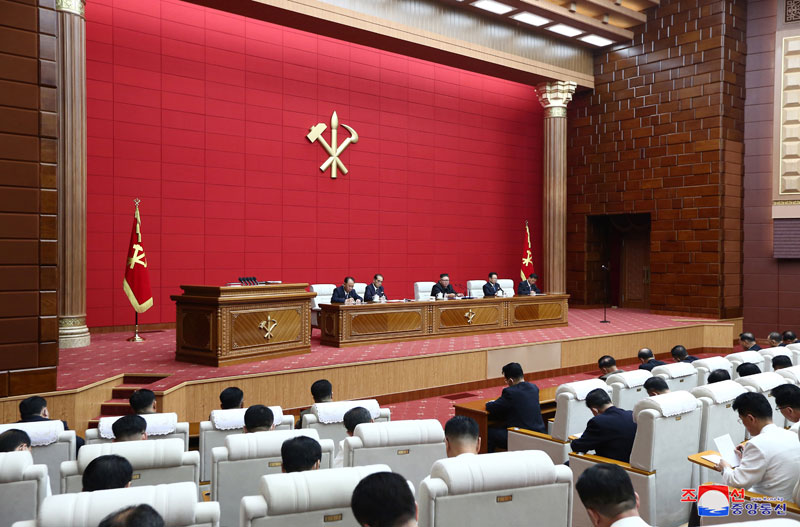
Overview of venue and participants of the 16th meeting of the Political Bureau of the 7th Central Committee in Pyongyang on 13 August 2020 (Photo: KCNA).
The Political Bureau’s agenda consisted of about six items: the DPRK’s ongoing efforts against the COVID-19 pandemic; reconstruction and relief efforts to cope with floods; setting up a brand new Central Committee Department; preparations for commemorating and celebrating the 75th anniversary of the foundation of the Party in style; and, a series of high-level personnel appointments.
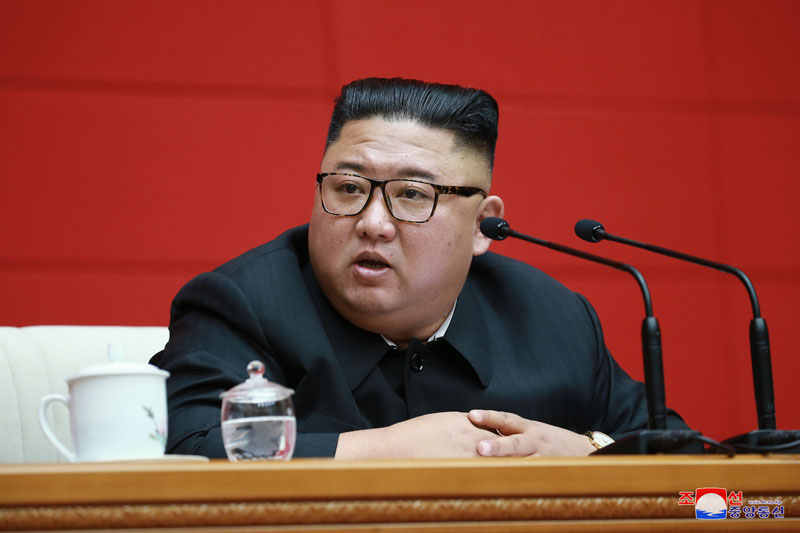
Kim Jong Un speaks during a 13 August 2020 Political Bureau meeting (Photo: KCNA)
The Political Bureau listened to a briefing on flood damage caused by Korea’s rainy season. According to KCNA, “during the rainy season 39 296 hectares [97, 102 acres] of crops were damaged nationwide including Kangwo’n, North and South Hwanghae Provinces and Kaeso’ng City” and at least 16 680 dwelling houses and over 630 public buildings were destroyed or inundated, lots of roads, bridges and railway sections broken, a dam of a power station gave way and there were other severe damage in various sectors of the national economy.” Flood damage was most severe in “Kimhwa, Ch’o’lwon, Hoeyang and Changdo Counties in Kangwo’n Province” and “U’np’a and Changp’ung counties in North Hwangahe.” People in these areas are “undergoing great pain in their living.”
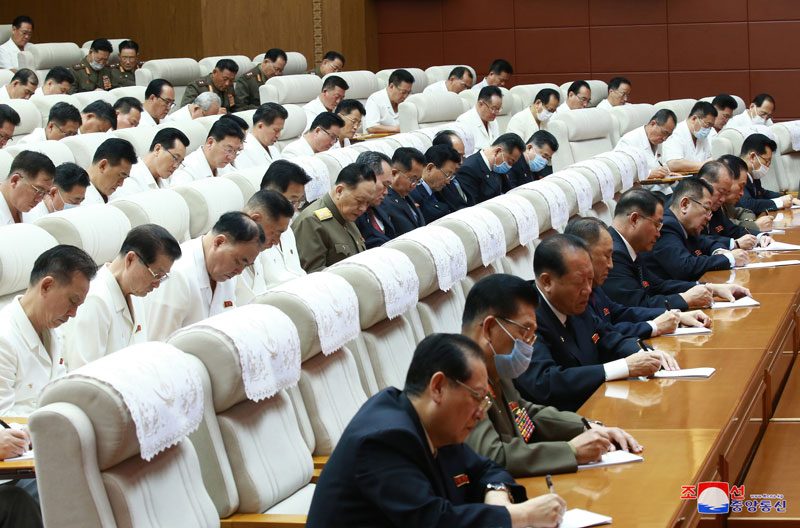
View of the 13 August 2020 Political Bureau meeting. In the front row (L-R): Thae Hyong Chol, Gen. Kim Su Gil, Choe Pu Il, Kim Yong Chol, Pak Thae Song, Choe Hwi, Ri Il Hwan, VMar Pak Jong Chon and Kim Jae Ryong (Photo: KCNA)
Kim Jong Un said that the “flood-stricken people must be suffering great as they are living in temporary dwelling places with their houses and family properties lost. It is a crucial time that our Party must be responsible for their living and we have to go closer to them to share the pain with them and to relieve them of their sufferings.”
The Suryo’ng stated that North Korea “faces two challenges: anti-epidemic work to thoroughly cope with the world public health crisis and [an] unexpected sudden natural disaster.” He indicated that “our Party and the government must set forth [a] correct policy direction to overcome these two crises at the same time and display excellent leadership arts in a three-dimensional and offensive campaign.” He stressed “the need to rapidly organize and take all necessary measures no matter how long the state emergency anti-epidemic work may last and how many obstacles and difficulties may lie ahead.” He called “on all the Party organizations and power bodies at all levels to properly discharge their roles. We can not make the flood-affected people celebrate the 75th anniversary of the Party homeless.”
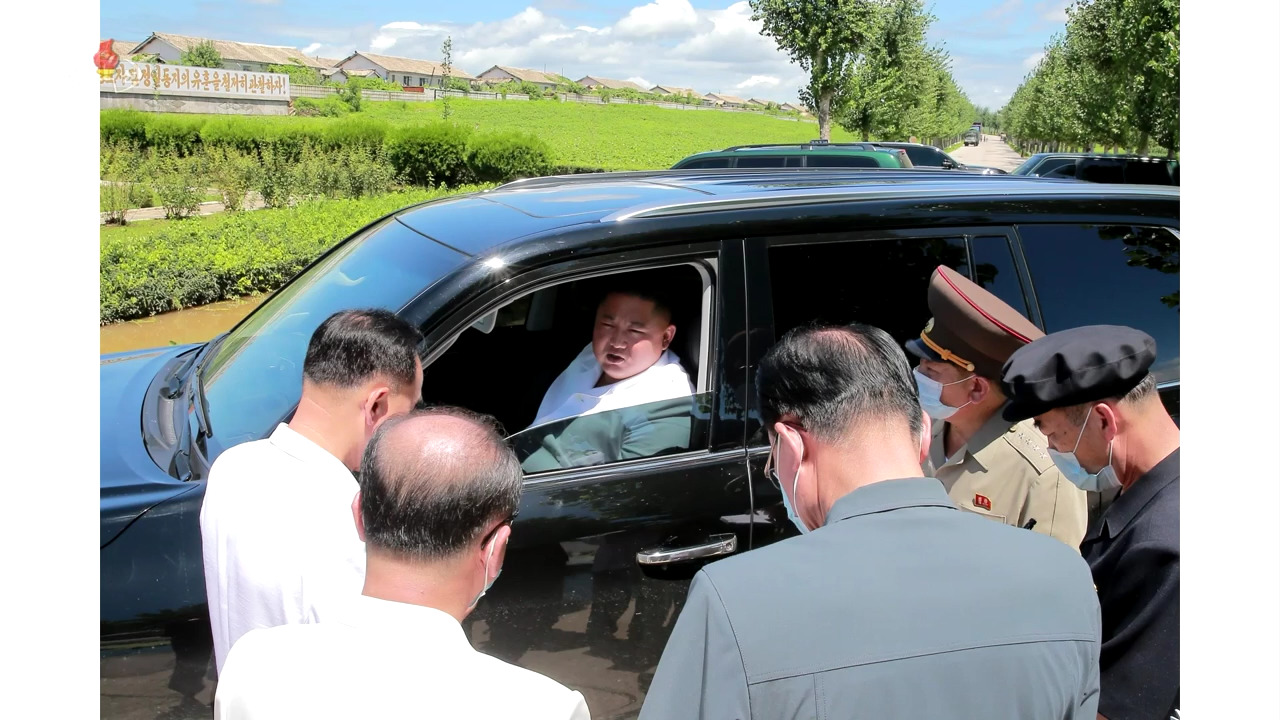
Kim Jong Un issues instructions after inspecting flood damage in U’np’a County (Photo: KCTV)
KJU said that the “flood damage rehabilitation should not just be confined to mere construction for removing the damage caused by natural disaster and restoration of the living conditions but should be carried out as an important political work for celebrating the 75th birth anniversary of the Party as a genuine holiday of the people and a revolutionary holiday cementing the single-minded unity.” He emphasized that “we should spruce up the flood-damaged area to meet not only the desire and wish of the people but also the high standard of the times, and ensure qualitative construction in appropriate places based on the opinions of the inhabitants so that no damage can occur even though there come more natural disasters and flood in the future.”
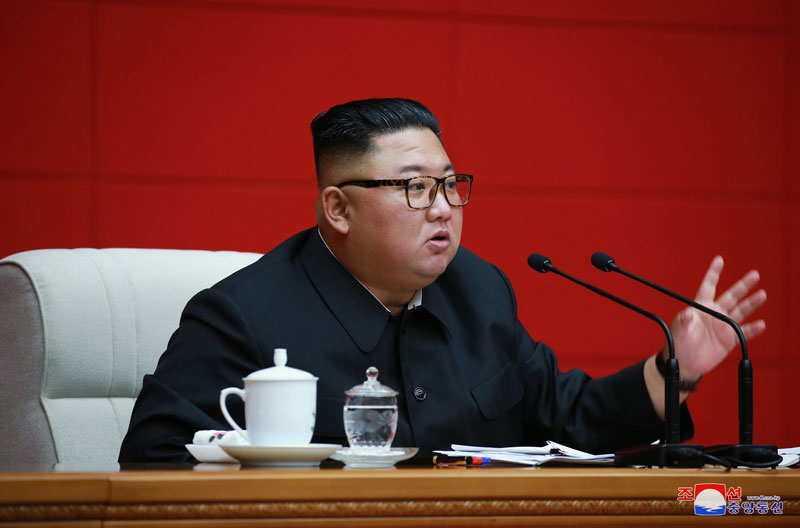
He also said that the current situation “in which the spread of the worldwide malignant virus has become worse, requires us not to allow any outside aid for the flood damage but shut the border tighter and carry out strict anti-epidemic work. Information work should be conducted well so as to prevent any violation of anti-epidemic rules among inhabitants in the flood-hit area and those mobilized for the rehabilitation work.” KJU said that “through the active rehabilitation drive we have to prove in practice once again the revolutionary nature of our Party which shares misfortune and pain with the people and protects them by removing all those pains, the advantages of our social system.”
KJU underscored the “need for our Party to fulfill its sacred duty so that it won’t feel ashamed of itself before the people and surely live up to the trust and expectation of the people” and suggested the Political Bureau issues a decision and a joint order of the KWP Central Committee, the Party Central Military Commission [CMC] and the State Affairs Commission [SAC] “reflecting the immediate fighting tasks for finishing the most part of the flood damage rehabilitation and stabilizing the people’s living by October 10 through the coordinated operation of the army and people loyal to the leadership of the Party based on the great unity.”
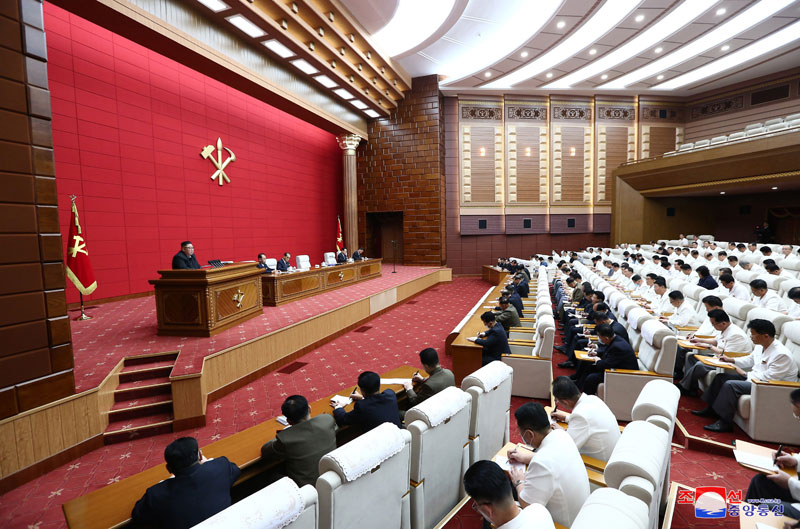
The Political Bureau “expressed unanimous approval for the ardent appeal of the Supreme Leader” and the meeting agreed on ” an issue of introducing new machinery for setting up nationwide regular anti-epidemic work system, now that the emergency anti-epidemic work has assumed prolonged nature…mentioned the issue for the new machinery to correctly exercise the authority it has been vested with and enhance its responsibility and role.” The Political Bureau also lifted the lock down in the Kaeso’ng area “which has been enforced from July 24 following the emergency incident in the forefront area, based on the scientific verification and guarantee by a professional anti-epidemic organization.”
Kim Jong Un said “following the past over 20 days of lockdown of the front line area it has been proved the situation of anti-epidemic work has been kept and controlled stably” and he expressed “thanks in the name of the Party Central Committee to the people in the locked-down area for having remained faithful to the measure taken by our Party and government, despite of inconvenience in their living under quarantine, and to soldiers, public security officers, security men and members of the Worker-Peasant Red Guards for having performed their duty of locking down the area with responsibility, despite of heavy rains and sultry weather.”
A report was read out about preparations for events and celebrations of the 75th anniversary of the Party’s foundation and “checked the issues arising in preparing every event and took due measures to prepare at the best level all the celebrations with peculiar style as a great political festival to be provided as an excellent gift to the 75th birth anniversary of the WPK.”
The Political Bureau discussed the possibility of establishing a new Central Committee Department and “defined its function and role.” It expressed its “belief that the department to be newly established will make tangible contributions to safeguarding the dignity and interests of the state and people, reliably supporting and guaranteeing the political stability and order of the society and impregnably defending our class position and socialist construction.”
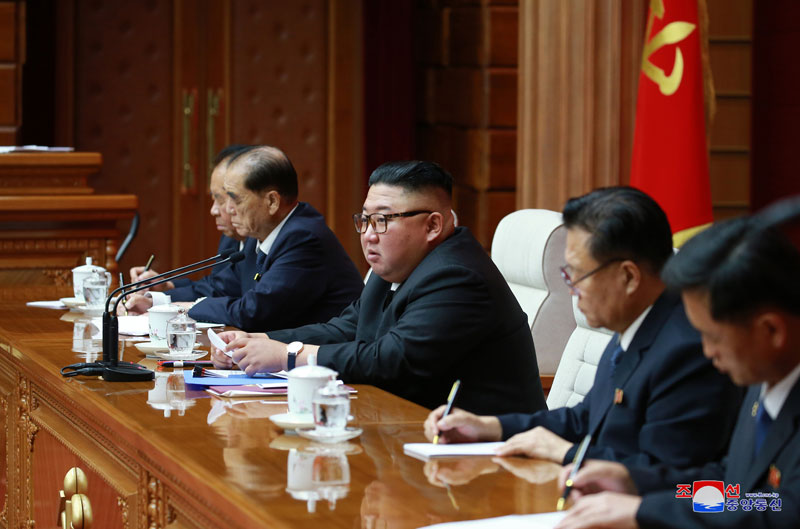
Photo: KCNA
Finally, the Political Bureau discussed personnel affairs or “an organizational matter.” Kim Tok Hun (Kim Tok-hun) and Ri Pyong Chol (Ri Pyo’ng-ch’o’l) were elected Presidium (standing committee) Members of the WPK Political Bureau. Pak Thae Dok (Pak T’ae-dok) was elected a member of the Political Bureau. Pak Myong Sun (Pak Myo’ng-son) and Jon Kwang Ho (Chon Kwang-ho) were elected alternate (candidate) members of the Political Bureau.
Acting on a Political Bureau proposal, Kim Jong Un, in his capacity as SAC Chairman, dismissed Kim Jae Ryong (Kim Ch’ae-ryong) as DPRK Premier and appointed Kim Tok Hun to replace him.
KWP Vice Chairmen and members of the Executive Policy Bureau (Council) were elected. Kim Jae Ryong and Pak Thae Dok were installed. Then, some KWP Central Committee Department Directors were dismissed and appointed in their places were Kim Jae Ryong, Pak Thae Dok, Pak Myong Sun, Jon Kwang Ho and Kim Yong Su (Kim Yo’ng-su). Kim Chol Sam (Kim Ch’o’l-sam) was appointed Chairman of the North Hamgyo’ng KWP Provincial Committee and Ri Jae Nam (Ri Ch’ae-nam) was appointed Chairman of the Namp’o City KWP Committee.
Premiere and Premier
The most significant development from the Political Bureau is arguably the replacement of Kim Jae Ryong by Kim Tok Hun as DPRK Premier. Kim Jae Ryong held one of the briefest terms as Premier in North Korean history, having been appointed in April 2019 (about 16 months). Whatever transpired along COVID-19 lines down in Kaeso’ng was Kim Jae Ryong’s third strike in leading the national anti-pandemic efforts. After the CEAH was organized, it may have proven ineffective and viewed as lacking “real power.” There were media reports claiming that some officials and DPRK citizens were violating lock-down orders. In late February, a Political Bureau meeting was convened and should have provided Kim Jae Ryong with the political backing and authorities that he needed. Kim Jong Un’s presence was essentially the Suryo’ng accepting responsibility for anti-epidemic efforts and providing political support to Kim Jae Ryong and CEAH.
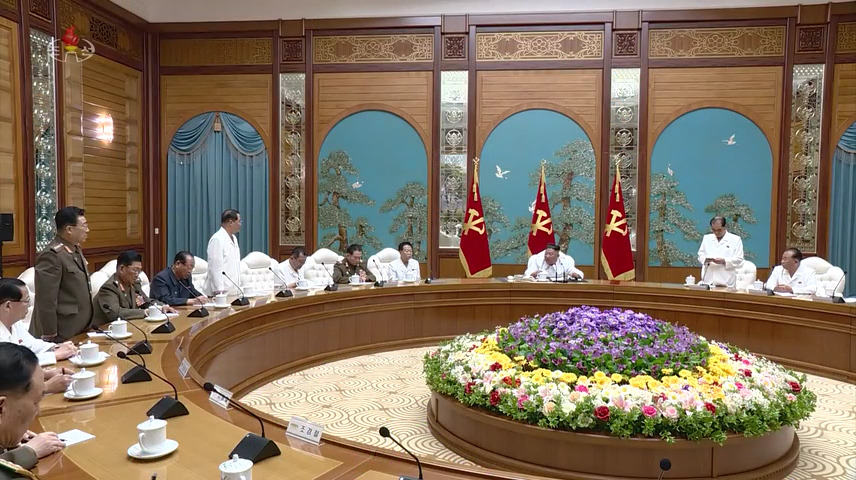
Kim Jong Un issues instructions to Jong Kyong Thaek, Pak Thae Song and Pak Pong Ju at a Political Bureau meeting in July 2020 (Photo: KCTV)
But, as Kim Jong Il would tell us, sometimes those bastards don’t listen. Whenever whatever flared up down in Kaeso’ng became too much for Kim Jae Ryong and his methods to process. The man had more than enough on his plate (note that he was “relieved” of his position) and Kim Jong Un brought in the Party boys. At the 15th Political Bureau meeting during late July, economic and political matters were tasked to Pak Pong Ju, medical matters were tasked to Pak Thae Song and rounding up the miscreants was State Security chief Gen. Jong Kyong Thaek. An an insurance policy that his orders were being obeyed, KJU dispatched Choe Ryong Hae for follow-on inspection tour and later on, his trusted enforcer Ri Man Gon to South Hwanghae.
Kim Tok Hun was appointed to replace Kim Jae Ryong. For the last eight (8) or so months, Kim Tok Hun has served as KWP Vice Chairman and Director of the KWP Cadres’ Affairs Department [CAD]. Two months after assuming the leadership of CAD, a scandal in the cadres’ training institutes was discovered. Kim Tok Hun has most likely earned Kim Jong Un’s trust because of this and he was probably viewed as the most effective official to step into a major position on short notice.
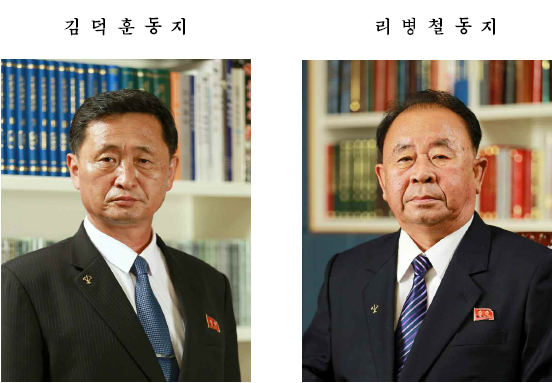
Kim Tok Hun and Ri Pyong Chol (Photo: Rodong Sinmun/KCNA)
RPC
Ri Pyong Chol continued his ascent into the core leadership. Whether he is KJU’s father-in-law, grandpa by marriage or Ri Sol Ju’s favorite uncle, Ri Pyong Chol now enjoys the “first among equals” status on the Political Bureau Presidium.
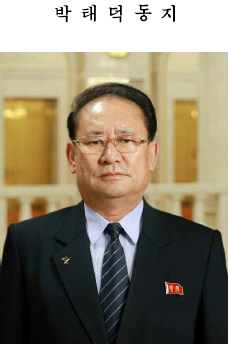
Pak Thae Dok (Photo: Rodong Sinmun/KCNA)

Pak Myong Sun and Jon Kwang Ho (Photo: Rodong Sinmun)
All the ladies in Pyongyang are scrambling to get out of town
The 16th meeting of the Political Bureau of the 7th Central Committee appears to have done some serious damage to the Central Committee Department Directors. At least five directors were replaced. Given the introduction of a “new Central Committee Department” and previous institutional behavior in which these departments consolidate, merge and spin off, there are probably two other directors moving office.
There are numerous recent reports linking Central Committee cadres to unauthorized sales of gold and platinum, prostitution, and illegal real estate and rental transactions. There is nothing implicating any of the departed department directors’ direct involvement in these matters. However they would be held responsible if an investigation links an individual director to a subordinate cadre or cadres who were involved.
Kim Jae Ryong and Jon Kwang Ho have migrated from the DPRK Cabinet to the positions of Central Committee Department Directors. It is unclear what departments Kim and Jon currently lead. Kim maintained a very prominent front row seat at the Political Bureau meeting either due to his prior status as Premier or to indicate that he is a leading department director.
Pak Thae Dok has probably been appointed to an economic or general service portfolio. He holds both the functional department directorate, as well as a slot on the Executive Policy Bureau and KWP Vice Chairman. Pak was removed from office entirely in February 2020. At the 13 August, Political Bureau meeting Pak had to be elected BACK onto the Central Committee indicating that when he fell six (6) months ago, he fell very hard. Pak was out of office and power for about six months which means that in February he was assigned a six-month course at the Higher Party School and he has been “revolutionized.”
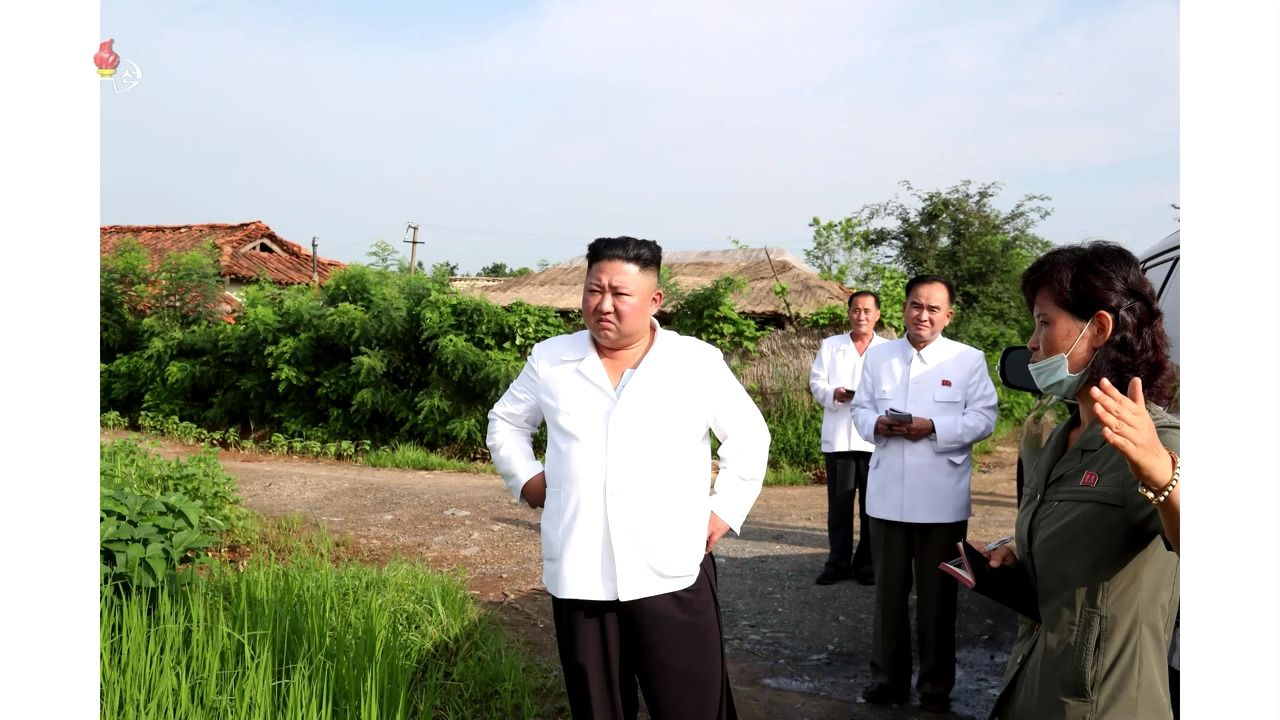
Kim Jong Un inspects flood damage in U’np’a County. Also in attendance, background center, is Kim Yong Su (Photo: KCTV)
Kim Yong Su has returned back to the CCDD fold. Maybe it was a sabbatical.
Finally, perhaps the most notable personnel appointment made was the elevation of Pak Myong Sun. Given the entirety of her career, she is most likely leading the KWP Light Industry Department or a similar economic affairs/consumer goods department. Pak Myong Sun is only the third woman (Kim Kyong Hui was the first) to serve as a Central Committee Department, and the second one (Han Kwang Bok is the first having a short tenure as SED Director in the 2010s) who was not directly related to Kim Il Sung or Kim Jong Il.
This is also the first time since 2010-2012 (Kim Kyong Hui; Kim Rak Hui) when the Political Bureau has two women members. KYJ and Pak Myong Sun also are both the younger sisters of core DPRK elites (KJU, and semi-retired ubercadre Pak Myong Chol).